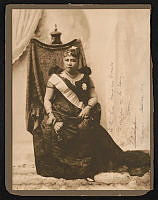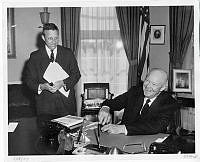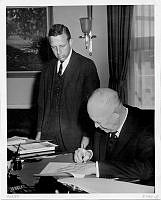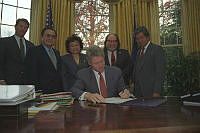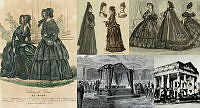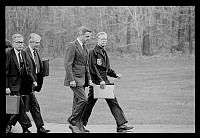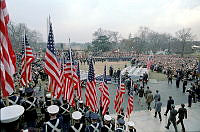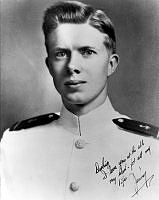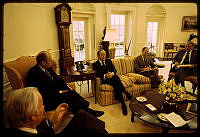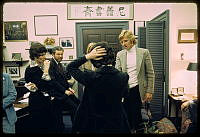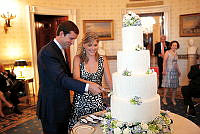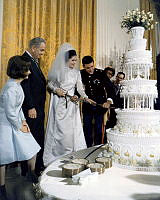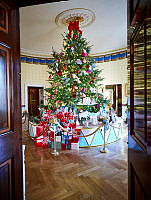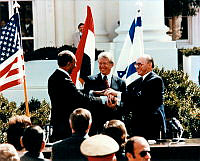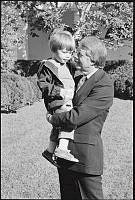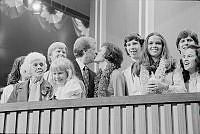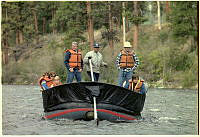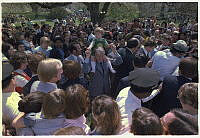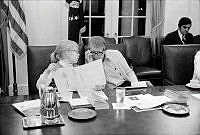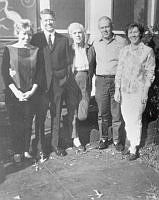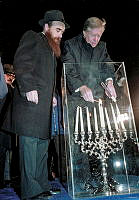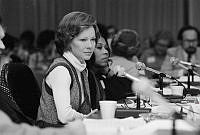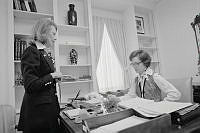"A House Divided Cannot Stand"
Andrew Jackson Donelson and the Pressures Placed on a Presidential Nephew
Copyright © Winter 2014 White House Historical Association. All rights reserved under international copyright conventions. No part of this article may be reproduced or utilized in any form or by any means, electronic or mechanical, including photocopying, recording, or by any information storage and retrieval system, without permission in writing from the publisher. Requests for reprint permissions should be addressed to books@whha.org
Over the course of six days in October 1830, President Andrew Jackson and his nephew and private secretary, Andrew Jackson Donelson, engaged in a tense exchange of letters while living under the same roof, the White House. The source of their conflict was the treatment of Margaret Eaton, wife of Secretary of War John Eaton. The president wanted Donelson to ensure that he and his wife, Emily, treated Margaret Eaton as a social equal, else he was going to banish Andrew and Emily Donelson to Tennessee. Donelson protested that Margaret Eaton was manipulating Jackson. “It was impossible that I could submit to the degradation of having a tribune of this character constituted for the purpose of determining what limits my good behaviour might secure the station which I held,” Donelson wrote his uncle. “Honorable as I deem that station,” he continued, “I scorn to hold it at the will of any one but yourself, or at the expense of those principles with which have grown up my love and gratitude for you.”1 Nothing was settled that fall; the following spring, Jackson wrote Donelson what appeared to be the theme of their relationship during these early years of the presidency: “‘a House divided cannot stand.’”2
Donelson’s relationship with his uncle was not always so tumultuous. From a young age at The Hermitage, he had found Jackson a supportive mentor. The White House years, however, exposed the fragility of their kinship ties and influenced the trajectory of Donelson’s public career.

Andrew Jackson raised and educated his nephew Andrew Jackson Donelson and even entrusted him to be his private secretary. The close relationship was jeopardized when Donelson and his wife questioned the character of Margaret Eaton and refused to socialize with her.
White House Collection/White House Historical AssociationPatriarch and Son
Andrew Jackson Donelson (1799–1871) was born into privilege. One of his grandfathers, John Donelson, cofounded Nashville; the other, Daniel Smith, was territorial secretary of the Southwest Territory and U.S. senator. Despite his family’s prominence, Donelson’s early childhood was filled with challenges. His father, Samuel Donelson, died in 1804. A few years later, his widowed mother, Polly Smith Donelson, married James Sanders, a man with whom Andrew Donelson and his two brothers, John and Daniel, often clashed. To preserve family harmony, the three Donelson boys moved in with relatives Andrew and Rachel Jackson, who provided them not only with a home but also with career and educational opportunities. For Andrew Donelson, these included attending Cumberland College in Nashville, the United States Military Academy in West Point, New York, and Transylvania University in Lexington, Kentucky.
Throughout these years, Jackson treated Donelson like a son. He not only provided him with a home and an education, but he also imparted life lessons. When Donelson was a cadet at West Point, his uncle sent him frequent missives imparting paternal advice about a number of topics, including finances, writing, honor, manliness, and relationships with women. As Donelson “entered on the theatre of the world” at West Point, for example, Jackson sent the young cadet a detailed letter of advice. He expressed “full confidence” in Donelson’s “morality and virtue” but warned that “many snares will be laid for the inexperienced youth to draw him into disapation, [sic] vice & folly.” Perhaps because of youthful experiences, Jackson made sure to remind his nephew to interact only with “virtuous females” and “shun the intercourse of the others as you would the society of the viper or base charector.” Associating with unvirtuous females “engenders corruption, & contaminates the morals, and fits the young mind for any act of unguarded baseness.”3 When Donelson became embroiled in a dispute with a commanding officer accused of physically assaulting cadets, Jackson advised his nephew to “suffer death before you will dishonour.” Commanders deserved respect, and a verbal insult might necessitate the resignation of his commission. But “if the superior attempts either to strike or kick you,” Jackson warned, “put him to instant death . . . never my son, outlive your honour—never do an act that will tarnish it.”4 By the time Donelson was studying law at Transylvania University, Jackson was able to express his confidence that his nephew would one day “be selected to preside over the destinies of america.”5
Throughout the 1820s, Donelson reinforced his uncle’s confidence in him in a number of ways. He became Jackson’s private secretary during the 1824 presidential campaign, a position that he held in some capacity for the rest of his uncle’s life. This apprenticeship placed him in contact with many of the period’s most influential political figures. In addition to handling much of Jackson’s correspondence, Donelson also assisted the Nashville Committee, which guided Old Hickory’s 1828 presidential campaign. While his duties were largely minor, as one would expect from a young protégé, Donelson demonstrated that he had embraced at least one of his uncle’s life lessons. During the last month of the campaign, Jackson ordered Donelson to travel to Alabama to confront James Jackson (no relation). Andrew Jackson wanted his nephew to “make it a personal affair” if his former friend and business partner did not agree to defend him from criticism about a controversial business deal.6 While the confrontation did not occur, Donelson’s willingness to challenge James Jackson to a duel over his uncle’s honor indicated his loyalty to the man who had acted as a father figure and political mentor toward him.

Emily Donelson was judged by Secretary of War John Eaton to be “young and uninformed of the ways and of the malice and insincerity of the world.”
White House Collection/The White House Historical AssociationA Storm in the White House
That fidelity makes it even harder to understand why Donelson’s relationship with his uncle fell apart so quickly once Jackson became president. Nothing was amiss at first. Stunned by Rachel Jackson’s sudden death soon after the presidential victory, Jackson, wanting family nearby, asked Donelson and his wife, Emily, who was also the president’s niece, to live with him in Washington. Moreover, the absence of a female family member meant that Emily Donelson could step in and assume the responsibilities of first lady. Even before Jackson took office, controversy erupted over the marriage between his incoming secretary of war and good friend, John Eaton, and Eaton’s new wife, Margaret O’Neale Timberlake. The Eaton scandal (or “Petticoat War,” as it was sometimes called) of Jackson’s first term significantly influenced Washington politics and disrupted family relations within the President’s House.
At its heart, the Eaton affair centered on Margaret Eaton’s character. Washington gossips had doubts about her morality prior to her first marriage to navy purser John Timberlake, and, after she was married, they questioned her relationship with Eaton, a family friend, while her husband was away at sea for months at a time. When Timberlake committed suicide during one trip, tongues wagged that he had uncovered an affair between his wife and his close friend. Agreeing to marry John Eaton less than a year into widowhood only fueled Margaret Timberlake’s critics, and her new husband’s public position in Jackson’s cabinet elicited severe disapproval in the tight political circle that surrounded the White House.
Andrew and Emily Donelson became embroiled in the controversy almost immediately. At Inauguration Day festivities and in the first few weeks of her uncle’s administration, Emily Donelson avoided socializing with Margaret Eaton when she could help it. “I have been so much disgusted with what I have seen of her,” she wrote her sister, “that I shall not visit her again.”7 This snubbing infuriated the Eatons and led John Eaton to write two patronizing letters to Emily Donelson, in which he judged her “young and uninformed of the ways and of the malice and insincerity of the world” of her new friends in the capital city.8 Not surprisingly, the Donelsons were offended by Eaton’s tone. Later that summer, the Donelsons and Eatons joined the president on an excursion to Norfolk, Virginia. During the trip, a pregnant Emily Donelson became faint. When Margaret Eaton offered her assistance, Emily Donelson refused to accept it. This fit of pique led Margaret Eaton to imply that she might convince Jackson to send his nephew and niece back to Tennessee if they did not treat her better.9

Margaret Eaton was pictured on a cigar box.
The White House Historical AssociationMargaret Eaton’s threat was not empty. Jackson was obsessed with seeing the Eatons accepted in Washington society and remained so well into 1831. The president’s fixation became obviously apparent in an extraordinary cabinet meeting in early September 1829. Jackson summoned two local ministers to appear before his cabinet officers (excepting Eaton) to provide evidence supporting their allegations of infidelity during Margaret Eaton’s first marriage. When one of the ministers refused to acknowledge that his evidence about her lack of virtue was weak, Jackson exploded, “She is as chaste as a virgin!”10
Donelson was present at that cabinet meeting, and if anyone knew how seriously Jackson believed in the Eatons’ innocence, it was him. Yet Donelson continued to insist to his uncle that he, and he alone, could determine with whom his family would interact. At the heart of the flurry of letters between Donelson and Jackson in October 1830 was Donelson’s assertion of patriarchal authority, an authority that Jackson acknowledged in theory. “Every head of a family have the right to govern their House hold,” he told his nephew early in the October 1830 exchange.11 Jackson believed that since Andrew and Emily were living under his roof, his patriarchal authority took precedence over his nephew’s. Therefore, his young relatives were required to bend to his will, not vice versa.
One of the ironies of the strained relationship that existed between Donelson and Jackson during the Eaton affair is that Donelson believed that he was following the advice about morality and honor that his uncle had given him while at West Point. Margaret Eaton was a woman who had demonstrated her lack of virtue, and Jackson’s counsel had been to avoid those types of women. If nothing else, Donelson could not be expected to allow a woman to threaten his political career and his wife’s social position. He also had his honor to consider. Elite southern gentlemen valued their honor—their public reputation—above everything, and Donelson simply could not allow himself to be bullied into socializing with a couple whose actions he deemed dishonorable. In fact, Donelson believed that he was not simply protecting his own honor but Jackson’s as well. He suspected that the Eatons were manipulating the president for their own political and private purposes, and just as he had during the 1828 campaign, Donelson was determined to defend Jackson’s reputation.
Donelson demonstrated his naivete in this regard. He failed to understand that Jackson appeared to see something of himself and his wife Rachel in the Eatons. The controversial origins of their marriage had been subjected to rumors and gossip during the 1828 presidential campaign, and Jackson, stricken with grief over his wife’s death in the months prior to his taking office, undoubtedly projected his emotions into the defense of his friends. Donelson also neglected to comprehend that throughout the Eaton episode, his uncle believed that his own honor was under attack and needed defending.

Margaret Eaton was photographed in her old age.
Library of CongressPolitical Fallout for Donelson
Following the conclusion of the Eaton affair, Andrew Donelson continued his secretarial duties of screening and writing his uncle’s private correspondence as well as helping to compose many of Jackson’s state papers. This work produced mixed results for Donelson. He gained invaluable political experience that helped his future public career, which included diplomatic posts in Texas and Europe and the editorship of Washington Union, a national Democratic newspaper. At the same time, fellow politicians often expressed little confidence in Donelson as an independent political actor. Two presidents passed over him for cabinet positions and his most notable appointment—as chargé d’affaires to the Republic of Texas—was based on his relationship with both Jackson and Texas president Sam Houston. When Donelson left the Democratic Party after being unceremoniously dismissed as editor of the Washington Union in 1852, former party allies reveled in pointing out that his success was due only to his uncle’s name and career. This dispute was prominent during the 1856 presidential campaign, when Donelson ran as the Know-Nothing Party’s vice presidential candidate. During an 1855 political meeting, he and fellow Tennessean Gideon J. Pillow came to blows over a disagreement about their commitment to the Union. A local newspaper editor wrote a blistering editorial criticizing Donelson for his arrogant use of his uncle’s name to get ahead politically. Donelson’s “blind furor and unpardonable self-importance” blinded him to the reality that “it was utterly impossible for him [Jackson] to cram his brains into another man’s head.” The “pretensions” of the late president’s nephew only “serve to remind the world of the ass that covered himself with the lion’s skin.”12 Or, as another newspaper gleefully pointed out, he was “Andrew Jackson, with the Donelson annexed.”13
Part of the reason that former friends and allies found it easy to disparage Donelson was because of his uncle’s own lack of confidence in him. Following the Eaton affair, Jackson never exhibited the same trust in his nephew. Donelson continued to serve a purpose, of course: his uncle needed someone close by to tend to his personal correspondence and personal affairs. But when Martin Van Buren and James K. Polk asked Jackson’s advice about appointing his nephew to their cabinets, his response was less than supportive. When Van Buren was putting together his cabinet in the winter of 1836–37, he considered appointing Donelson as his secretary of war. After consultation with a Tennessee friend, however, he decided the position “would be regarded as an advancement disproportioned to the stations he had before occupied.” According to Van Buren, Jackson told him that “the same idea has passed through his own mind.”14 A similar situation occurred eight years later, when Polk was formulating his cabinet. Donelson’s name was on the list of potential officers and had support from prominent Democrats. When Donelson wrote Polk declining to have his name put forward, he hinted that Jackson, who initially recommended him for the secretary of war position, had talked his nephew out of pursuing the matter.15 Instead, he supported Donelson’s appointment to a foreign diplomatic post, a request with which Polk complied.

In 1856, Andrew Jackson Donelson ran for vice president on the Know Nothing ticket.
Library of CongressDonelson's Personal Sacrifice
Donelson’s loyalty to his uncle was rewarded in one other significant, and heartbreaking, way. In the spring of 1836, while her husband and uncle remained in Washington, Emily Donelson returned to Tennessee to live at the couple’s new home, Poplar Grove (renamed Tulip Grove in the early 1840s), adjacent to Jackson’s Hermitage property. Her health had been declining, and the situation became so serious that Andrew Donelson spent two months, from August to October, at home helping to take care of her.
Donelson talked often that year of permanently resigning his position. But by mid-October, Jackson was pressuring him to return to Washington to finish up his final annual message and tend to other unfinished tasks, so Donelson acquiesced to his uncle’s wishes and said good-bye to his wife. He planned to return in mid-November, but when Jackson had a near-fatal hemorrhage, Donelson decided to stay longer in Washington to help out. Throughout the weeks apart from his wife, Donelson received several letters from relatives, neighbors, and even Emily herself updating him on her condition. Their optimistic tone only encouraged him to postpone his departure until December 3. Donelson’s delay cost him dearly: he arrived home two days after Emily Donelson died.

Andrew Jackson Donelson built Poplar Grove on land adjacent to Andrew Jackson’s Hermitage property. The home was completed in 1826 and his wife Emily died there in 1836. Now known as Tulip Grove it was purchased by the Ladies’ Hermitage Association in 1964. A view of the west front is pictured below in 1940.
Library of CongressWhen Donelson himself died in June 1871, one obituary noted that his “long political career of mingled prosperity and adversity, had somewhat soured the impulses of a naturally amiable nature.”16 Not all of this bitterness was due to the consequences of the Eaton affair, of course. Like many southerners, he suffered significant losses during the Civil War, including property and family, and found the social and economic changes fostered by Reconstruction difficult to accept. It is hard, however, not to juxtapose the promise of Donelson’s early political career with his break with the Democratic Party and his public disputes with relatives and former friends during the 1856 presidential campaign. While not writing specifically about Donelson, one antebellum writer captured what Jackson’s nephew must have felt as he matured:
"Take, for example, a youth who feels both the desire and ability to achieve the loftiest distinction. He embarks in the career of his hopes, believing that all the glorious lessons he has learned are now to be reduced to practice—that the great models whom he has before his eyes, and in whose footsteps it has always been his fondest wish to walk, he may now perchance triumphantly imitate—that he, too, may one day read his blessings in the nation’s eyes. Almost at the first step he finds he must truckle to what he knows to be caprice, or delusion, or vice, which he will not flatter; . . . with hopes and spirits bruised, he retires from the contest, abandoning it to the mercenaries whose struggles alone are applauded by the people."17
The Eaton affair was a pivotal event in Donelson’s life. Ironically, it taught him that adhering too closely to his uncle’s lessons, which were intended to make Donelson successful, placed him in a precarious position, that had lifelong political and personal consequences.













